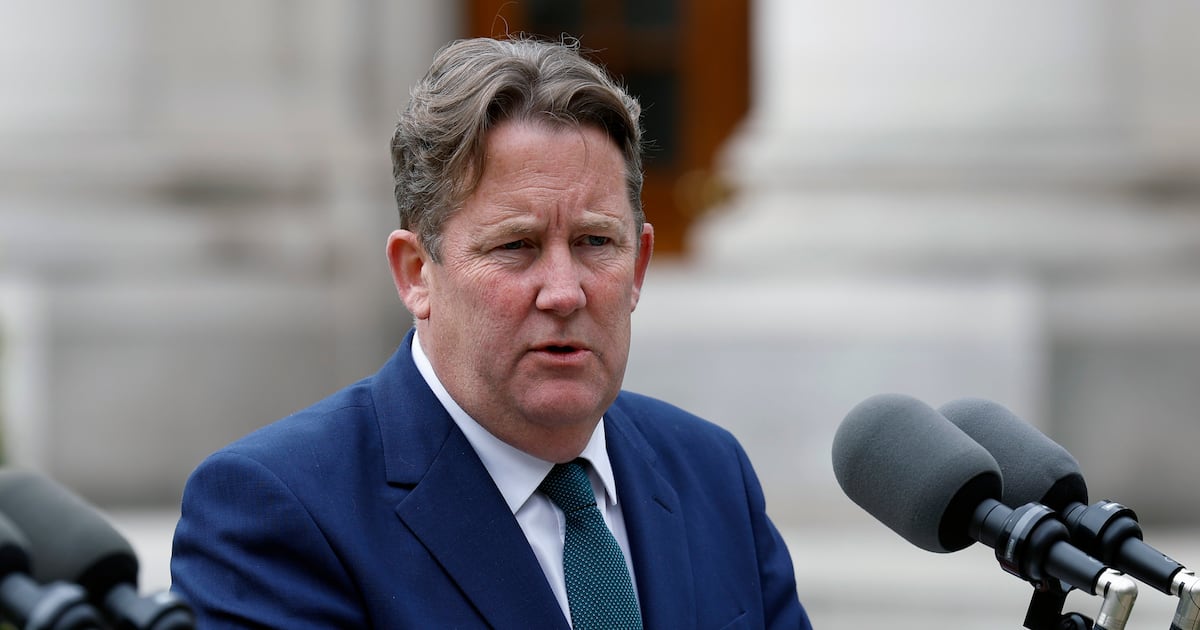Top Stories
Urgent Climate Compliance Warning: Ireland Faces €26 Billion Costs

UPDATE: Ireland is facing a critical juncture in its climate strategy as officials warn that failure to meet emissions targets could result in compliance costs soaring between €8 billion and €26 billion post-2030. This urgent message comes from the Climate Change Advisory Council (CCAC) and the Irish Fiscal Advisory Council (Ifac), who have expressed deep concern over the government’s dismissive stance toward necessary climate actions.
Earlier today, Minister for Climate Darragh O’Brien referred to the warnings as “back-of-the-envelope stuff,” a statement that has raised eyebrows among environmental experts and policymakers alike. The CCAC-Ifac report makes it clear: if Ireland continues on its current emissions trajectory, it will be forced to purchase carbon credits from other nations that have successfully reduced their emissions. This would mean spending billions instead of investing those funds in sustainable initiatives.
WHY THIS MATTERS NOW: The fight against climate change is not just about compliance; it’s about securing a sustainable future for Ireland. The financial watchdogs point out that investing in retrofitting buildings, electrifying transport, and supporting farmers in decarbonisation now could save Ireland from hefty penalties later. With record budget surpluses, the government has a unique opportunity to act decisively.
The report highlights that the EU’s compliance regime is not speculative; it is a fundamental aspect of the EU Climate Law. The notion that Ireland might evade penalties due to its size or the delayed accounting until 2032 is misguided. Ireland is projected to exceed its emissions allocations more significantly than any other EU member state.
WHAT’S NEXT: The forthcoming Climate Action Plan represents a pivotal opportunity for the government to align its policies with its legal obligations. It must deliver concrete actions rather than vague promises. The pressure is mounting for the government to use its financial and political capital to create a cleaner, more sustainable future.
Critics argue that while the government blames planning delays and bureaucracy for slow progress, the real shortfall lies in its lack of investment in critical areas such as transport and agriculture. The electricity sector is already decarbonising, but without urgent investments, Ireland risks falling behind in its climate commitments.
As Taoiseach Micheál Martin stated, “we cannot litigate our way” to climate success, but he also warned that words without action will lead to public cynicism. With the COP27 conference having recently emphasized the need for urgent action, the question remains: will the government heed this call or delay until it’s too late?
The clock is ticking, and Ireland’s window to act is closing fast. The government must now choose between prioritizing its climate responsibilities or risking significant financial and environmental repercussions. The stakes are high, and the community is watching closely as this situation develops.
As climate obligations loom, will Ireland rise to the challenge or miss the opportunity to lead in sustainability? The decisions made in the coming weeks will determine not only financial outcomes but also the future of Ireland’s climate integrity. The urgency is palpable, and the time to act is now.
-

 Top Stories3 months ago
Top Stories3 months agoTributes Surge for 9-Year-Old Leon Briody After Cancer Battle
-

 Entertainment4 months ago
Entertainment4 months agoAimee Osbourne Joins Family for Emotional Tribute to Ozzy
-

 Politics4 months ago
Politics4 months agoDanny Healy-Rae Considers Complaint After Altercation with Garda
-

 Top Stories4 months ago
Top Stories4 months agoIreland Enjoys Summer Heat as Hurricane Erin Approaches Atlantic
-

 World5 months ago
World5 months agoHawaii Commemorates 80 Years Since Hiroshima Bombing with Ceremony
-

 Top Stories3 months ago
Top Stories3 months agoNewcastle West Woman Patricia Foley Found Safe After Urgent Search
-

 Top Stories5 months ago
Top Stories5 months agoFianna Fáil TDs Urgently Consider Maire Geoghegan-Quinn for Presidency
-

 World5 months ago
World5 months agoCouple Convicted of Murdering Two-Year-Old Grandson in Wales
-

 World5 months ago
World5 months agoGaza Aid Distribution Tragedy: 20 Killed Amid Ongoing Violence
-

 World5 months ago
World5 months agoAristocrat Constance Marten and Partner Convicted of Infant Murder
-

 Top Stories4 months ago
Top Stories4 months agoClimbing Errigal: A Must-Do Summer Adventure in Donegal
-

 Top Stories4 months ago
Top Stories4 months agoHike Donegal’s Errigal Mountain NOW for Unforgettable Summer Views









